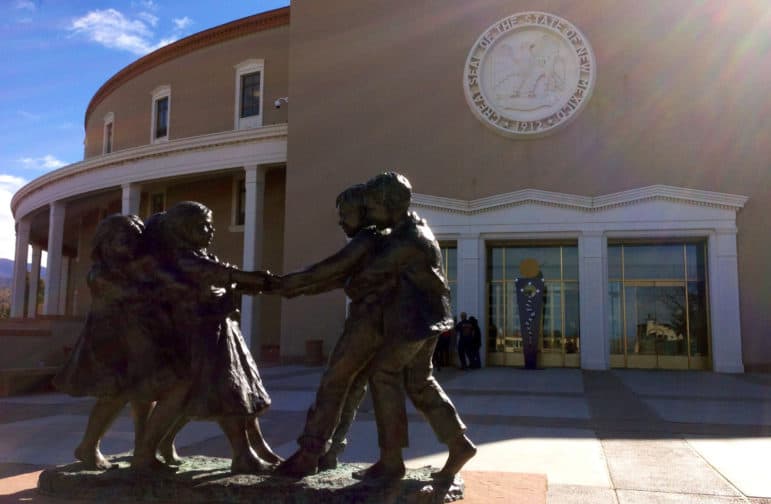
Heath Haussamen / NMPolitics.net
A statue outside the Roundhouse in Santa Fe.
State House members are headed for a showdown with the Senate over cuts to higher education and public health programs when they return to the Capitol on Wednesday to resume a special session of the New Mexico Legislature to deal with a budget crisis.
Virtually all House members agree they will have to lop the 2017 spending plan to address an unconstitutional gap between spending and projected revenues, but dueling proposals have set up a debate over what to slash and how deep to cut.
Unclear is whether Republicans and Democrats can come together in the heat of an election season to give a series of budget bills the two-thirds support in both chambers needed for the legislation to take effect immediately and address the $600 million shortfall.
In an unusual move, the Democrat-led Senate over the weekend passed a bill to cut the state’s budget and temporarily adjourned.
House Republicans offered their own plan Monday, calling for steeper cuts to public universities.
However, Senate President Mary Kay Papen, D-Las Cruces, said Tuesday her colleagues would not accept deeper reductions in higher education funding.
House Republicans have rejected a proposal narrowly passed by the Senate on Friday to delay implementation of corporate income tax reductions. But rebuffing the proposal and holding the party line against raising taxes meant House Republicans had to look elsewhere for additional savings.
To make up the difference, House Republicans support deeper cuts to higher education, particularly The University of New Mexico, which stands to lose 8 percent of its general-fund money. Other colleges and universities face a 6 percent reduction.
The Department of Health also comes in for steeper cuts under the House Republican plan, which calls for slashing its budget 5.5 percent.
And House Republicans would cut more than twice as much as the Senate from the state’s public museums, historic sites and arts programs, shaving the Department of Cultural Affairs’ budget a total of $1.6 million.
But House Republicans propose exempting the Department of Public Safety and Children, Youth and Families Department from reductions. A bill passed by the Senate calls for slashing about $1.5 million and $1.8 million from each department, respectively.
Republicans lambasted the proposed cuts to those agencies during a press conference on the House floor Monday.
Democrats countered that cuts to the Children, Youth and Families Department would not affect child protective services but instead come from savings in the budget for facilities and jobs that have not been filled.
The plan offered by House Republicans would also restore $5.9 million out of $96.4 million the Senate proposal would cut from public education.
Rep. Jason Harper, R-Rio Rancho, argued keeping lower corporate tax brackets in place is worth the cost in lost revenue and additional cuts to higher education.
“We are in a budget crisis. We need to diversify our economy. The answer is not raising taxes,” he told reporters Monday, suggesting raising taxes on some businesses would deter potential investors in the state.
House Republicans have called for raiding the Legislature’s pension fund, too. But Democrats argue the state Constitution does not allow for using the funds and claim it would set a precedent for pilfering other pension accounts.
The House Republican budget plan is likely to face fierce opposition from Democrats in both chambers.
House Democrats were quick Tuesday to criticize proposals for additional cuts to higher education and public health programs.
In a mass email, House Democrats labeled the proposal “a plan that only Trump could love,” referring to the Republican nominee for president.
If budget cuts and accompanying financial legislation do not pass without two-thirds support in both the House and Senate, however, the measures will not take effect until January, halfway through the fiscal year.
“It doesn’t work unless you have all the pieces taking effect immediately,” said House Minority Leader Brian Egolf, D-Santa Fe. “So we need to make sure as we get to this final piece that it is going to be a bipartisan effort.”
But Egolf described emotions in the House as frayed by election-season politicking.
Meanwhile, House Majority Leader Nate Gentry, R-Albuquerque, has criticized Senate Democrats for adopting what he described as a “take-it-or-leave-it approach.”
Contact Andrew Oxford at 505-986-3093 or aoxford@sfnewmexican.com. Follow him on Twitter at @andrewboxford.